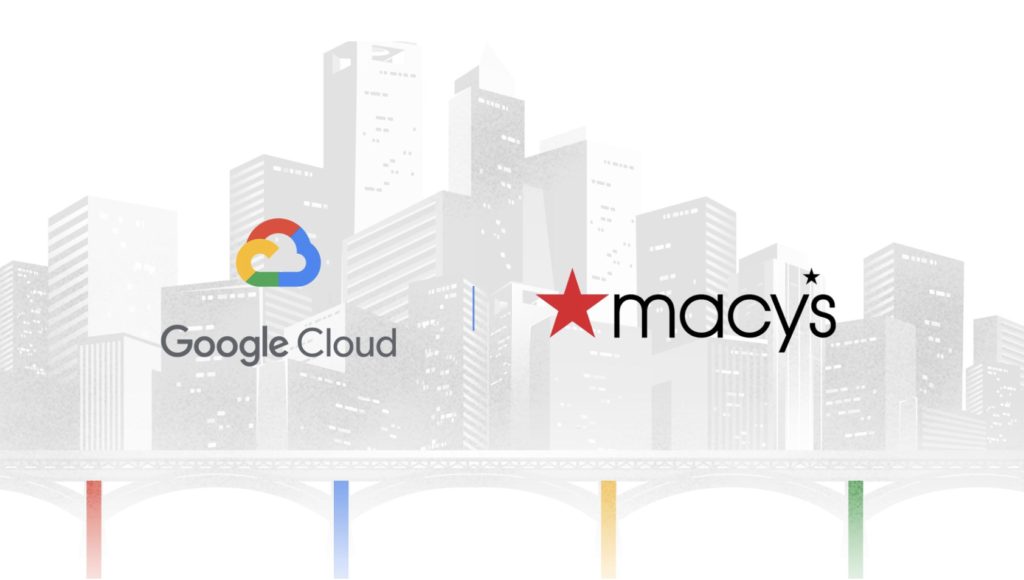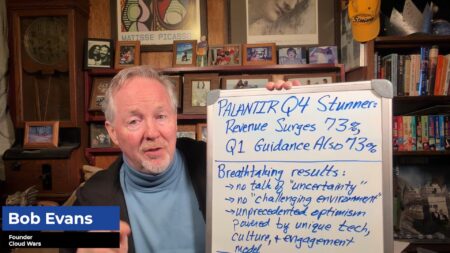While SAP and Google Cloud currently enjoy an excellent relationship as strategic partners in the cloud, their shared desire to lead the emerging market for industry-specific solutions could cast them as competitors in the near future.
Both companies have expressed strong intentions to create for their customers a new type of data-driven application powered by AI and ML and that delivers unprecedented levels of vertical-industry capability.
So let’s take a look at what the CEOs of Google Cloud and SAP have recently said. From there, we can try to assess if there’s a battle looming or if each will pursue separate growth opportunities. We’ll start with Google Cloud, which is already generating significant revenue from its early efforts, and then explore SAP’s plans.
Thomas Kurian on industry-specific apps
Google Cloud CEO Thomas Kurian outlined his intentions for these “industry-specific solutions” late last year in an exclusive Cloud Wars interview tied to his being named our CEO of the Year. The video at that link will give you a good sense of why Kurian sees this as a huge new opportunity for Google Cloud.
And while speaking at an investors’ conference in February, Kurian doubled down on those plans. In fact, he said they’d become his #1 priority for Google Cloud. In that conversation with Goldman Sachs analyst Heather Bellini, here’s how Kurian differentiated these forthcoming apps from traditional enterprise apps per my analysis as the time, Google Launches New Era in Cloud with AI-Powered Industry Solutions:
“When you look at our industry-specific solutions, a lot of investment has already gone into business-process automation: ERP, supply chain, logistics, etc.
“We are not trying to replace those solutions; those business-process implementations take years, and there’s a lot of cost associated with going to a customer and telling them ‘Please rip out your supply chain,’ ” Kurian said.
“However, what we are doing is helping them, by using our data analytics and machine learning, extract data from these solutions and be much more intelligent in how these applications function.”
Kurian said that these forthcoming industry-specific apps are very specifically not designed to compete with traditional enterprise applications, and are in fact designed to complement those in-place apps with an extensive array of modern technologies.
In staking out that position, Kurian emphasized that in developing and offering these entirely new solutions, Google Cloud will leverage a wide range of expertise from across the entire Google organization: ML, AI, big data, analytics, digital marketing and advertising, understanding consumer behavior, being able to predict consumer behavior, product discovery, and more.
Kurian also emphasized that Google Cloud has zero intention of developing traditional enterprise applications such as those used for CRM, HCM and ERP. Rather, Kurian said, this new wave of AI- and ML-powered solutions will extract data from those traditional “line-of-business” applications and then use advanced technologies and capabilities to optimize specific outcomes for complex industry-specific challenges.
New cloud technologies making ripples across Alphabet
Before sharing a great customer story involving Macy’s deployment of one of Kurian’s new industry-specific apps, let me first mention that this new type of cloud technology is already having an impact on the financial results for Google Cloud.
During parent company Alphabet’s recent Q1 earnings call, Alphabet CFO Ruth Porat specifically called out this new category. That’s quite remarkable given the very recent emergence of these solutions and the exclusive nature of being highlighted on an earnings call, particularly at a massive company like Google.
Porat said Google is “very pleased” with the “strong customer adoption” of the industry-specific solutions, which Kurian is very specifically employing to create significant differentiation for Google Cloud from primary competitors Microsoft and Amazon. You can read all about that in Google Outpaces Microsoft, Amazon in Cloud-Revenue Growth at 52%.
A customer case study: Google Cloud & Macy’s
Kurian shared this anecdote about how Macy’s is using one of GC’s new AI-powered vertical apps at the Goldman Sachs event in February. Here’s how my earlier analysis explained that Macy’s story in a project that Kurian said was completed in just 3 months:
Macy’s had been told by various ERP vendors that such an optimization would be “a long process because they’d have to re-implement their entire ERP system.”
The problem, Kurian said, was that Macy’s needed to have a digital-era supply chain powered by ML and AI. But the company was stuck with traditional applications running on mechanistic “rules rather than based on AI models.”
Rather than requiring that Macy’s undergo that massive, expensive and time-consuming ERP overhaul, Google Cloud “helped them keep their existing supply-chain application, extract their data from it, use our Machine Learning and AI platform and our analytics platform, and optimize their distribution center,” Kurian said.
“We were able to do it with their first distribution center between June and August last year—a much shorter time-window but delivering extremely high value for them because it helped them optimize a big cost-item.”
SAP CEO Christian Klein: “We will respond decisively to that demand”
In SAP’s Q1 earnings call late last month, CEO Christian Klein didn’t offer much detail but made it unmistakably clear that SAP is eager and ready to become a force in this emerging market for specialized vertical solutions.
This comment from Klein’s opening remarks made SAP’s intentions perfectly clear: “In every industry, processes are affected by digital transformation. SAP traditionally was strong in vertically differentiating across industries. To run their value chains end-to-end, our customers want SAP to drive more vertical-industry-specific processes in the cloud with seamless integration to SAP Cloud solutions based on the SAP Cloud Platform. We will respond decisively to that demand.”
That bold vision—and I have to say I love Klein’s promise to “respond decisively to that demand”—is vital for a number of reasons, not least of which is that as of May 1, SAP has dropped its co-CEO structure with Klein now running the company himself. You can check out my thoughts on that in As SAP CEO Flies Solo, 10 Insights into Christian Klein and SAP’s Future.
Amid COVID-19 crisis, “ERP is more relevant than ever”
On that same earnings call, Klein made the case that the company’s flagship S/4HANA ERP system is growing in popularity because the accelerating demands of business today—intensified by the coronavirus crisis—are making ERP more strategic.
“And especially in times like these, when I talk now to many CEOs, but also to the public sector, I mean they now realize that ERP is more relevant than ever when these lockdowns happen, when the supply chains are getting disrupted,” Klein said on the call.
“Suddenly we are having a very different kind of talk: we are not talking anymore about the backend ERP and only automating transactional processes. Now it’s about how you can react to fast-changing demands in the front office and pushing all that through the supply chain, which is highly resilient.”
It is precisely that type of transformative demand that is forcing companies to reinvent their processes from end to end and kicking open the door for the type of verticalized and industry-specific apps that Google Cloud has begun to deliver and SAP is planning to roll out.
And roll them out, as Klein said, “decisively.”
RECOMMENDED READING
Can Larry Ellison Turn Zoom & Autonomous DB into Big-Time Oracle Cloud Revenue?
Q1 Cloud Revenue Roundup: Microsoft, AWS and Google Total $26.3 Billion
How Bill McDermott’s Magic Touch Has Made ServiceNow a Cloud Superstar
Microsoft CEO Satya Nadella: 10 Thoughts on the Post-COVID-19 World
Microsoft & Amazon Lead Top 5 Beyond $150 Billion in Cloud Revenue in 2020
Google Outpaces Microsoft, Amazon in Cloud-Revenue Growth at 52%
Zoom Picks Oracle for Cloud Infrastructure; Larry Ellison’s First YouTube Video
Subscribe to the Cloud Wars Newsletter for in-depth analysis of the major cloud vendors from the perspective of business customers. It’s free, it’s exclusive and it’s great!








